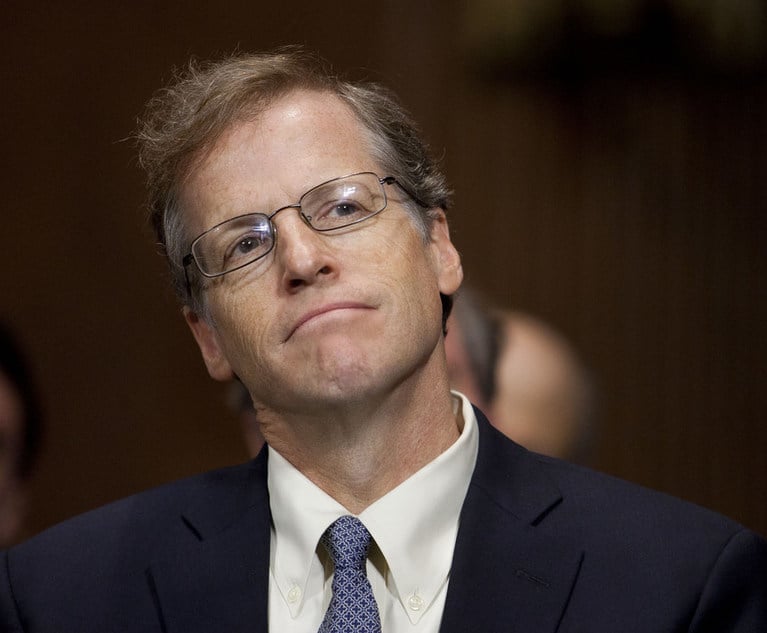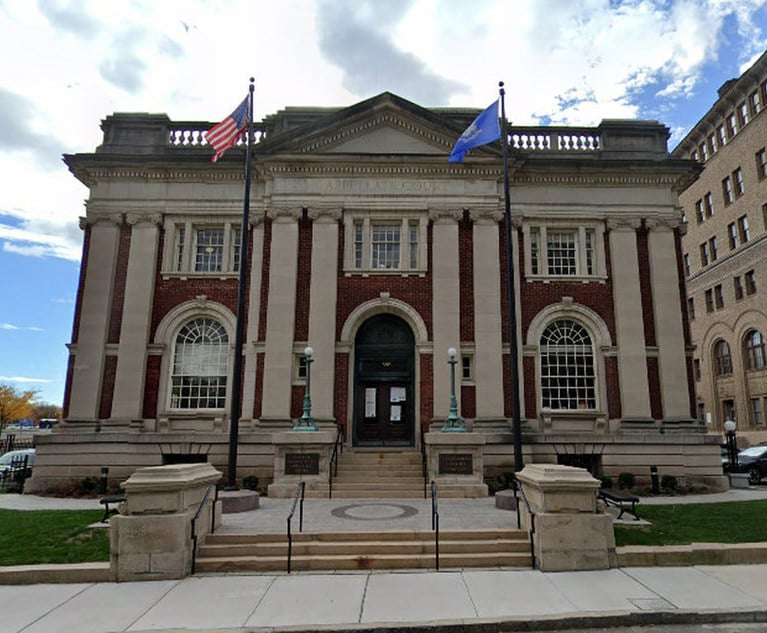Viewpoint: A Solution In Search of a Problem
The Rules Committee of the Superior Court will consider a proposed amendment to Rule 1.11 of the Rules of Professional Conduct at its Nov. 16, meeting.…
November 10, 2017 at 02:55 AM
4 minute read
The Rules Committee of the Superior Court will consider a proposed amendment to Rule 1.11 of the Rules of Professional Conduct at its Nov. 16, meeting. Rule 1.11 is entitled “Special Conflicts of Interests for Former and Current Government Officers and Employees.”
The rule provides that no lawyer who formerly served as a public officer or employee of government shall represent a client in connection with a matter in which the lawyer participated personally and substantially as a public officer or employee unless the agency gives written informed consent.
The proposed amendment seeks to ban grievance counsel, disciplinary counsel, bar counsel and members of the grievance committee and panels from representing clients before the grievance committee and panels for one year after serving in their disciplinary role.
Such a proposal is a solution in search of a problem. There have been several individuals who have left the office of disciplinary counsel and who have gone into private practice representing clients before the grievance committee or panels. No litigant, committee, panel (or court in presentment matters) has disqualified, or moved to disqualify, such an attorney. And if such a motion to disqualify were to be filed, the present system for dealing with such motions provides adequate protections for all the parties concerned.
The commentary to the current Rule 1.11 cautions against an overly restrictive limitation that would prevent the orderly transfer to and from government positions. The proposed blanket prohibition conflicts with this commentary and holds such attorneys captive in their present positions. Moreover, disciplinary authorities have a vested interest in hiring or appointing the most qualified lawyers. The proposal will cause prospective employees and committee and panel members to avoid accepting such positions, especially those who are volunteers.
The proposed ban brings back the appearance of impropriety standard that the Rules Committee long ago eschewed as too subjective, vague and overly broad. Indeed, the commentary to the proposed amendment states, “[t]he reason for the amendment to this provision is to establish rules to avoid conflicts of interest and appearances of such conflicts by those engaged in the disciplinary process.”
Criminal prosecutors, public defenders, attorneys in the probate court administrator's office, attorneys general and employees employed in the judicial branch such as clerks are exempted from Rule 1.11's proposed ban. This raises huge equal protection problems. Is it fair that the standard for disciplinary prosecutors be higher and more stringent than the standard for criminal prosecutors? And, ironically, what about superior judges who go into private practice to work as attorneys and/or mediators? There is no similar bar that applies to former judges.
The proposal interferes with a client's right to choose counsel of their choice for no good reason. It also imposes on former disciplinary counsel, committee or panel members an impossible burden in running a proper conflict check, because former disciplinary counsel, committee and panel members have no access to disciplinary counsel files and data base.
We are unaware of any other state that has adopted the proposed amendment to Rule 1.11. The current rule is derived from the model rules and reflects a national standard. It reflects a careful balancing of interests. There simply is no evidence that the current Rule 1.11 is problematic. There is no reason to believe that such attorneys affected by Rule 1.11 do not properly self- police themselves by identifying matters in which they have a conflict of interest. Rather, there is reason to believe that they have been acting properly because there are no reported problems and such attorneys are acutely familiar with issues involving conflicts of interest. The Connecticut Bar Association have consistently opposed the proposed amendment in one version or another. We similarly oppose the proposed amendment.
Yes, we are self- regulated profession. That does not mean we have to need to be an overly regulated profession. Rule 1.11 over regulates. The Rules Committee of the Superior Court should reject the proposed amendment to Rule 1.11 of the Rules of Professional Conduct.
This content has been archived. It is available through our partners, LexisNexis® and Bloomberg Law.
To view this content, please continue to their sites.
Not a Lexis Subscriber?
Subscribe Now
Not a Bloomberg Law Subscriber?
Subscribe Now
NOT FOR REPRINT
© 2025 ALM Global, LLC, All Rights Reserved. Request academic re-use from www.copyright.com. All other uses, submit a request to [email protected]. For more information visit Asset & Logo Licensing.
You Might Like
View All
35 Years After CT's Affordable Housing Act, Progress Remains a Struggle
4 minute read

Trending Stories
- 1We the People?
- 2New York-Based Skadden Team Joins White & Case Group in Mexico City for Citigroup Demerger
- 3No Two Wildfires Alike: Lawyers Take Different Legal Strategies in California
- 4Poop-Themed Dog Toy OK as Parody, but Still Tarnished Jack Daniel’s Brand, Court Says
- 5Meet the New President of NY's Association of Trial Court Jurists
Who Got The Work
J. Brugh Lower of Gibbons has entered an appearance for industrial equipment supplier Devco Corporation in a pending trademark infringement lawsuit. The suit, accusing the defendant of selling knock-off Graco products, was filed Dec. 18 in New Jersey District Court by Rivkin Radler on behalf of Graco Inc. and Graco Minnesota. The case, assigned to U.S. District Judge Zahid N. Quraishi, is 3:24-cv-11294, Graco Inc. et al v. Devco Corporation.
Who Got The Work
Rebecca Maller-Stein and Kent A. Yalowitz of Arnold & Porter Kaye Scholer have entered their appearances for Hanaco Venture Capital and its executives, Lior Prosor and David Frankel, in a pending securities lawsuit. The action, filed on Dec. 24 in New York Southern District Court by Zell, Aron & Co. on behalf of Goldeneye Advisors, accuses the defendants of negligently and fraudulently managing the plaintiff's $1 million investment. The case, assigned to U.S. District Judge Vernon S. Broderick, is 1:24-cv-09918, Goldeneye Advisors, LLC v. Hanaco Venture Capital, Ltd. et al.
Who Got The Work
Attorneys from A&O Shearman has stepped in as defense counsel for Toronto-Dominion Bank and other defendants in a pending securities class action. The suit, filed Dec. 11 in New York Southern District Court by Bleichmar Fonti & Auld, accuses the defendants of concealing the bank's 'pervasive' deficiencies in regards to its compliance with the Bank Secrecy Act and the quality of its anti-money laundering controls. The case, assigned to U.S. District Judge Arun Subramanian, is 1:24-cv-09445, Gonzalez v. The Toronto-Dominion Bank et al.
Who Got The Work
Crown Castle International, a Pennsylvania company providing shared communications infrastructure, has turned to Luke D. Wolf of Gordon Rees Scully Mansukhani to fend off a pending breach-of-contract lawsuit. The court action, filed Nov. 25 in Michigan Eastern District Court by Hooper Hathaway PC on behalf of The Town Residences LLC, accuses Crown Castle of failing to transfer approximately $30,000 in utility payments from T-Mobile in breach of a roof-top lease and assignment agreement. The case, assigned to U.S. District Judge Susan K. Declercq, is 2:24-cv-13131, The Town Residences LLC v. T-Mobile US, Inc. et al.
Who Got The Work
Wilfred P. Coronato and Daniel M. Schwartz of McCarter & English have stepped in as defense counsel to Electrolux Home Products Inc. in a pending product liability lawsuit. The court action, filed Nov. 26 in New York Eastern District Court by Poulos Lopiccolo PC and Nagel Rice LLP on behalf of David Stern, alleges that the defendant's refrigerators’ drawers and shelving repeatedly break and fall apart within months after purchase. The case, assigned to U.S. District Judge Joan M. Azrack, is 2:24-cv-08204, Stern v. Electrolux Home Products, Inc.
Featured Firms
Law Offices of Gary Martin Hays & Associates, P.C.
(470) 294-1674
Law Offices of Mark E. Salomone
(857) 444-6468
Smith & Hassler
(713) 739-1250











